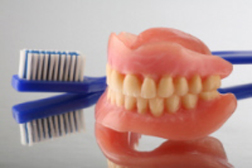 Extrapolate those behaviors over the course of 30 years, as some contributors to message boards can attest, and that seemingly harmless overage adds up.
Extrapolate those behaviors over the course of 30 years, as some contributors to message boards can attest, and that seemingly harmless overage adds up.Two products in particular have been formulated with zinc: Super Poligrip, manufactured by GlaxoSmithKline (GSK), and Procter & Gamble's (P&G) Fixodent. Both products stated that when used as directed (the application of several minute beads or drops across the denture, as opposed to a thick and gooey continuous strip) the denture cream would be safe and effective.
There is little doubt about that—as the Fixodent denture cream Web site continues to maintain. The average daily Fixodent user, according to P&G, would ingest zinc equivalent to levels found in six ounces of ground beef, and less than the amount of zinc found in most daily multivitamins, or six oysters (fried or raw).
It can be assumed that such levels are based on product use as directed. However, the question remains: how much importance is placed on basic human nature?
The US Food and Drug Administration (FDA), in addressing the denture adhesive zinc poisoning issue when it surfaced two years ago, issued a statement with regard to denture adhesives.
"The US Food and Drug Administration (FDA) regulate[s] denture adhesives, which are medical devices under the Food, Drug and Cosmetic Act. A denture adhesive is a device intended to be applied to the base of a denture before the denture is inserted in a patient's mouth to improve denture retention and comfort.
"FDA has classified this product as a low-risk device (class I). While manufacturers are not required to submit marketing applications to FDA for most class I devices, they still must register and list a class I device with the agency and comply with other applicable FDA requirements. These requirements include adverse event reporting, manufacturing controls, and labeling that is neither false nor misleading."
The debate, of course, is what constitutes false and misleading information. Advocates for the manufacturers will state that so long as consumers are advised to use the product according to a specific set of directions, and zinc levels are considered safe within the parameters of those directions, then the manufacturers are covered.
Critics will point out that if excessive use of denture cream can cause denture poisoning (from the denture cream), then failure to include that fact on labeling is a miscue.
The manufacturer of Poligrip products, GSK, has since introduced a line of denture creams that do not contain zinc, in response to the concern. P&G is being lobbied to do the same.
Beyond labels and directions, and recommendations lay the talisman of basic human nature—something that even the FDA may have missed when the agency classified denture adhesives containing zinc as a Class I device, with low risk. To that end, the risk is low when used as directed.
READ MORE FIXODENT DENTURE CREAM POISONING LEGAL NEWS
Thus, using a bit more won't hurt…
Factor in that job interview or that high school reunion, or those dentures that are old and don't fit well, and suddenly you are using copious amounts of the product without realizing the danger.
Fixodent denture adhesive remains an issue so long as the product contains zinc. Increasing zinc levels in the body beyond amounts required for optimum health causes an imbalance of zinc and copper, depleting copper levels and creating an environment that has been found to result in neuropathy. Critics have noted previously the lack of a specific caution against using excessive amounts in relation to the risk for denture cream zinc poisoning.

READER COMMENTS
Bob Read
on
maurice tremblay
on
kATHRYN Du Puis
on